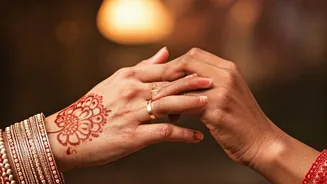Understanding Cultural Differences
Cultural clashes in love often stem from differences in communication styles, family expectations, and personal values. Communication styles can vary,
with some cultures emphasizing directness while others prefer indirect approaches. Family expectations, such as arranged marriages, roles within the household, and financial contributions, can also cause conflict. Differing personal values regarding religion, social customs, and individual freedoms further complicate matters. Recognizing these differences is the first step towards understanding and empathy. It's essential to acknowledge that neither partner's cultural perspective is inherently superior; rather, they are simply different. This understanding forms the foundation for building a relationship that respects and celebrates both individuals' backgrounds, fostering a more inclusive and harmonious partnership.
Open Communication: The Key
Establishing open and honest communication is paramount for navigating cultural differences in relationships. Couples should create a safe space where they can express their feelings, needs, and concerns without fear of judgment. Active listening is crucial; it involves paying close attention to the partner's words, tone, and nonverbal cues. This helps in understanding their perspective, even if it differs from one's own. Regularly discussing cultural differences, traditions, and expectations allows couples to address potential conflicts proactively. It enables the building of mutual respect by sharing backgrounds, values, and experiences, which cultivates a strong foundation for a lasting and fulfilling relationship. Such dialogues foster understanding and empathy, creating a strong sense of connection and commitment, ultimately strengthening the bond between the individuals.
Building Mutual Respect
Mutual respect forms the cornerstone of a successful intercultural relationship. This involves acknowledging and valuing each partner's cultural background, traditions, and beliefs. Neither partner should try to diminish the other's cultural identity. Instead, each person must embrace the diversity and richness that each individual brings to the relationship. This may involve learning about each other's languages, customs, and holidays, which shows a genuine interest in the partner's heritage. Respectful behavior includes being mindful of cultural sensitivities and avoiding actions or words that could be considered offensive. Supporting each other's cultural practices and encouraging the exploration of the other's heritage builds a strong partnership that celebrates differences. This celebration leads to a deeper, more meaningful connection, thus making the relationship stronger.
Navigating Family Dynamics
Family dynamics are crucial in Indian relationships, and cultural differences can significantly impact these relationships. It's common for families to have specific expectations regarding marriage, roles within the household, and interactions. Couples should discuss their families' expectations early on and together find ways to navigate them. This may involve setting boundaries, communicating effectively, and seeking compromise. It is crucial to respect the family's traditions while maintaining the individual's needs and values. Educating each other's families about their respective cultures can reduce misunderstandings and promote acceptance. Involving family members in relationship decisions while maintaining the couple's autonomy is essential. When both partners work to build a supportive relationship with each family, it strengthens the connection and creates a supportive network that benefits the entire family.
Compromise and Flexibility
Compromise and flexibility are vital for managing cultural clashes and building a harmonious relationship. Both partners must be willing to make adjustments and adapt to each other's needs and cultural practices. This involves identifying areas where compromise is possible and finding solutions that satisfy both parties. Flexibility means being open to change and accepting that the relationship will evolve over time. This might include adapting to new traditions, embracing different communication styles, or adjusting to family expectations. It is necessary to be patient and understanding, recognizing that adapting takes time and effort. Regularly reassessing the relationship and making adjustments as needed is key to maintaining a healthy partnership. Through compromise and flexibility, couples can learn to integrate their cultural differences, create a shared identity, and build a lasting, fulfilling connection.
Seeking External Support
Sometimes, navigating cultural differences can be challenging, and couples might need external support. Consider seeking help from a therapist, counselor, or relationship coach experienced in intercultural relationships. These professionals can provide unbiased perspectives, facilitate communication, and offer strategies for conflict resolution. They can help couples understand each other's cultural backgrounds, address communication challenges, and manage family dynamics. Joining support groups or online forums can provide couples with an opportunity to connect with others facing similar challenges. Sharing experiences and learning from others can be invaluable. Consulting with cultural advisors or mediators can provide practical advice and insights into specific cultural issues. When couples recognize that seeking support is a sign of strength and not weakness, they can enhance their ability to build a relationship that embraces diversity.













